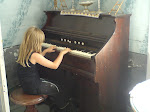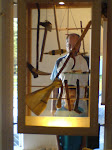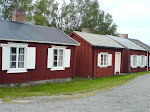Spontaneously and swiftly written as so many times... In the (nowadays) impatient k-style! :-)
This week there was a review “A new exciting dissertation about the brothers Björling” in a local newspaper in the county where Jussi Björling was born (Dalarna), about the upbringing of the opera singer Jussi Björling and his brothers,
In the beginning the boy’s mother Esther joined these tours, but 1917 she died, only 35 years. The boys – then 4, 5 and 7 years – sang at her funeral, a scene as Borlänge tidning [Borlänge newspaper] later described as: “The small boys Björling sang a Norwegian hymn in the crypt [gravkor], but when the coffin was sunken into the grave these small ones burst into tears.”
One can see before ones eyes how the well drilled boys stiffly obeys the task to sing for mom – but later, when soil (??) is falling down on the coffin, everything bursts. No wonder!
Nine years later their father also dies in the middle of a tour, but despite this the boys carry an advised concert through the same day. So deep was their feeling of duty towards the audience. Anything else was unthinkable?
David Björling had been denied engagement at the Royal Swedish Opera in
The reviewer thinks it is easy to associate to the singing children in Sound of Music –based on a story of a real family-choir, where the children were drilled with strict discipline.
At the linked site it stands about the Trapp-family:
"Even when the family was at the height of their popularity, Maria would not let them rest. The ten children (Maria and Georg had three children together) toured up to eight months a year. During the summer they worked their Vermont farm and ran a music camp. The isolation of a life on the road or on the farm, combined with constant work and Maria's volatile temper, took its toll. Rosmarie, Maria's eldest child, suffered a nervous breakdown and her mother sent her for electro-shock therapy. Another daughter ran away to elope. Before long, Maria was forced to hire non-family members for the family singing group. The family suffered, but Maria made them sound harmonious and heroic in her book, The Trapp Family Singers, which she wrote as a way to help promote the group."
David Björling seemed to have pursued a strict education and the children weren’t allowed to go to school for many years; daily education (singing?), rehearsals and concerts more or less robbed them from a real childhood. And I think Jussi later felt a lack of all-round education his whole life, i.e. he felt inferior in that sense. Maybe even seriously handicapped!? Yes, I think it was like that... (maybe one of many reasons why his outer appearance was "humble and simple" *)!!??)
Further it stands about “the father’s exceptionally early started and enthusiastically performed singing education”.
The author of the dissertation draws parallels to today’s popular Suzuki-method. Hmmm, yes, I have an education in this method from the College of Music in Malmö, an education (25% of full time studies) I finished last year, in fact... On top of a former piano-pedagogue-education from a private music-college. And I agree in many senses to be honest... I find this method and many of their executors a bit elitist how nice everything can sound round it... As the Swede I am?? :-) Strange we have produced any artists at all here in Sweden!?? Except for those as Jussi Björling who was trained so early in life!?
The Finnish-Swedish journalist Yrsa Stenius has written a book about Jussi Björling "Tills vingen brister" in which she mentions that the father David gave his sons larynx's massage… She wonders over this… Forcing things on small kids…
With astonishment I established that Jussi Björling was only 49 when he died in a heart-attack. I had to count and count again ad again, because he looks older!?
In her book Stenius writes about Björlings grave problems with alcohol and about his drinking brothers. And my feeling when reading her book (which came five years ago) is that Björling deliberately drank himself to death.
He seemed to have been much tied up to his wife (this according to Stenius book), and when he came home from a tour or from just having been out, he always shouted “Mom, are you there?”
or something in that style, to make sure his wife was present. In middle-age still missing his mom...
And this small man seemed to have attracted women and he had not so few affairs with other women. Astonishing to me to be honest, how beautifully he even sang...
See the Jussi Björling society in USA. On this site it stands (Americans writing this!!! :-)):
"Despite his fame across three continents, Jussi remained *) a humble and simple man, deeply devoted to his family."
 photo on Jussi Björling.
photo on Jussi Björling.But there has never been any question that we should get proper educations! As we all have, in different areas. I hadn’t planned working with music (or?? Were there in fact no options, then??). I sought different other programs after the gymnasium… And could have thought of working with something entirely different than what I am now doing.
There was lack of attention. Something we all suffered from? And probably not only because of that we were so many who should share this attention!! But not least because mom and dad were so occupied with their own problems: themselves (not always conscious about it), their relation and marriage, their work (dad’s work very much my whole childhood and mom went back to work when I was 16)… We lived at dad’s workplaces (agricultural schools in different parts of the country) with all what that meant. In a small world, in a way isolated from the surrounding world and all people's eyes on the headmasters family? It feels as I am writing about stone-age!!! In an entirely different life and era!
And each child had to take a role, a role was ascribed each of us?? Not outspoken?
Mine was to be the clever big sister? My first teacher at school said to my parents I was very talented… She probably had comparison material after over 40 years work as teacher. We were her last class. So, I don’t know, she pointed this out to them in a way, and they got high expectations on me, expectations they didn't really have earlier? Because I have had a feeling as grown up that mom and dad didn’t really realize what sort of children they had got… How shall I describe this? They minimized us, as hey minimized themselves, in a way?? And maybe in another way not??
Mom often (always) feeling worthless and as failure as mother (we had to assure her of something else, and still has to?)!! Dad hardly seeing us at all and even less treating us with respect and as equals… (I, and maybe more of my siblings, had it easier at school than he had had?). He looked up to professors etc. And what was a child compared to a professor?? Nothing! As a professor was a better person too.
Dad and his sister had got the opportunity to learn to play instruments when they grew up. Dad the violin and his sister piano. A little surprising I think, from what I know. My grandparents belonged to the lower middle-class??? But there was more artist-interests in that family and more educated people than in mom's.
When dad started his education to agronomist in
When he was student at the gymnasium in the town where I am living since long, he was lodger or roomer during the weeks since his parents lived 50 km away, and then the communications were quite different compared to today too… Dad quited the gymnasium here 1940, one year later than the class-mates in his age… He has said to mom that many times when he should go back to school on Sundays there was a quarrel at home, so when he went away for a whole week he was quite out of mood… Leaving not being in balance...
When I started to play the piano (at 9 years) he fairly soon wanted me to accompany his singing…
But my one and only interest wasn’t music though…
Yes, there is a lot more to tell… Maybe more about that later!?






























Inga kommentarer:
Skicka en kommentar